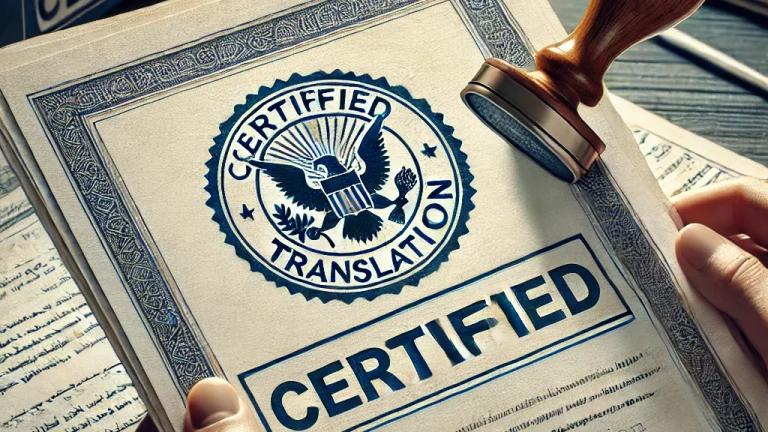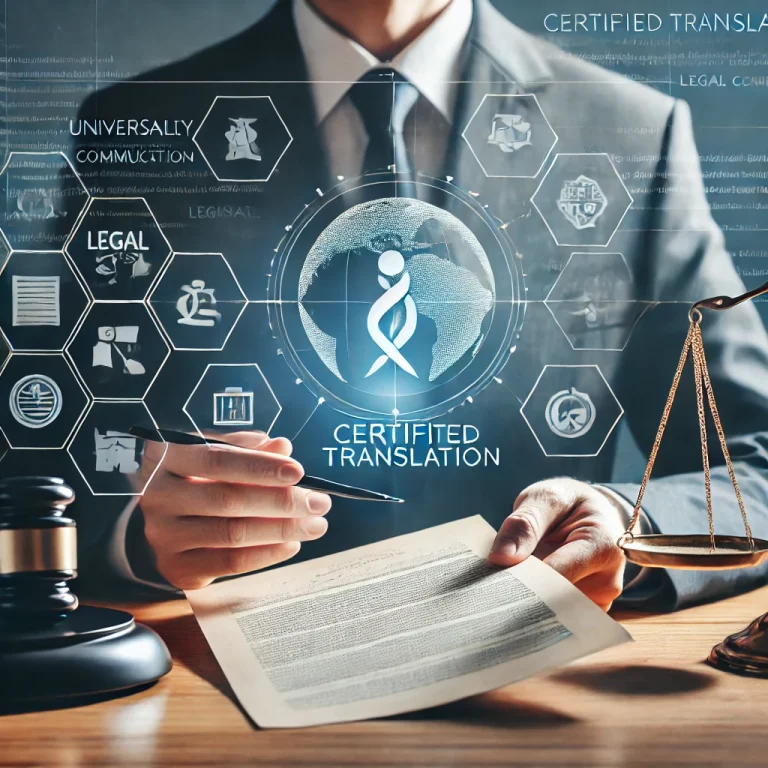In an interconnected world where businesses and individuals interact across borders, the need for clear and accurate communication is more important than ever. Nowhere is this more evident than in legal documents, where a minor error in translation can have significant consequences. Whether it’s for contracts, certificates, or court documents, certified translation plays a crucial role in ensuring the validity and enforceability of legal paperwork across different languages and jurisdictions.

Certified Translation: A Key to Legal Accuracy
In today’s globalized world, communication across borders is essential. Legal documents require precision and care, as any error in translation can lead to significant misunderstandings or even legal disputes. Legal translation ensures that the content is both accurate and binding across different languages. For instance, when dealing with contracts or agreements, having an accurate translation is vital to maintaining legal clarity. Without reliable translation, the parties involved could misinterpret important terms, leading to potential issues.

What is Certified Translation?
Certified translation is the translation of a document by a qualified translator, who guarantees that the translated text accurately reflects the original. This process is especially significant for legal documents such as birth certificates, marriage licenses, contracts, and court papers. Unlike standard translations, a certified translation is usually accompanied by a signed statement (a certificate of accuracy) that attests to the authenticity and accuracy of the translation.
Certified translations are often required by legal and governmental institutions in different countries. For a list of certified translation requirements, visit the American Translators Association (ATA).
This level of certification is essential when submitting documents to official bodies, including government agencies, immigration offices, and courts. It ensures that the translated document has the same legal standing as the original and is recognized by the relevant authorities.
Why Certified Translation is Essential for Legal Documents?
Legal documents are complex, filled with precise language. Errors in translation can cause serious issues. For example, a poorly translated contract might lead to the misunderstanding of obligations. As a result, parties may face legal disputes. Furthermore, many governments require certified translations for documents like birth certificates and immigration papers. This requirement ensures the document is legally recognized in the new jurisdiction.
Certified translations reduce risks. Because they guarantee that all legal terms are accurately translated, misunderstandings are minimized. Therefore, legal compliance becomes easier for all parties involved. In addition, international transactions or agreements often depend on certified translations to ensure transparency. For more on minimizing legal risks in translation, visit our legal translation services.
Why Legal Translation Should Be Certified?
Legal translation goes beyond simple word-for-word translation. It involves understanding both the legal systems of the source and target languages. Mistakes in legal translation can lead to severe consequences. For instance, a mistranslated clause in a legal contract could invalidate the entire agreement. Additionally, incorrect translations may result in financial losses or damage to a company’s reputation.
Therefore, only certified translators with legal expertise should handle these types of documents. This way, certified translations offer a high level of assurance that every legal term has been properly translated.
The Critical Role of Certified Translation Offices
A certified translation office plays a pivotal role in the accurate translation of legal documents. These offices specialize in legal and certified translation services, ensuring that the translations meet both linguistic and legal standards.
Certified translation offices employ translators who are not only proficient in both the source and target languages but also well-versed in the legal terminology and practices of different countries. This expertise allows them to handle complex legal documents, from contracts and agreements to court rulings and official certificates.
Additionally, certified translation offices provide an extra layer of assurance by offering a certificate of accuracy, which is crucial for the document’s acceptance by legal and governmental bodies.
How to Select the Right Certified Translation Office?
Choosing the right certified translation office is a crucial step in ensuring that your legal documents are translated accurately. Here are some factors to consider:
Experience in Legal Translation: Not all translation offices are created equal. You should ensure that the office you choose has experience handling legal documents, such as contracts, immigration papers, and court documents.
Accreditations and Certifications: The office should have proper certifications and accreditations from recognized translation associations, such as the American Translators Association (ATA) or other local regulatory bodies. These accreditations ensure that their translations are accepted by legal and governmental institutions.
Check that the office is certified by recognized institutions like the Chartered Institute of Linguists, ensuring that their translations are accepted by legal and governmental bodies.
Language and Legal Specialization: Some documents may require specialized knowledge of legal terms or regulations. For instance, a contract dealing with intellectual property law would need a translator familiar with that particular field of law.
By considering these factors, you can ensure that the translation office you select is capable of delivering accurate, certified translations that meet your legal requirements.
The Risks of Inaccurate Legal Translations
Inaccurate translations of legal documents can lead to numerous problems. For instance, a contract could be rendered void if a key clause is mistranslated, resulting in legal disputes and renegotiations. In addition, poorly translated legal documents can lead to financial losses for companies due to breaches in contracts or delays in legal processes.
Furthermore, errors in legal translation can damage a company’s reputation, especially if misunderstandings occur during international business dealings. This is why working with a certified translation office is essential to avoid such risks.
Conclusion: Ensuring Compliance with Certified Legal Translations
In conclusion, certified legal translations are essential for maintaining accuracy and ensuring compliance with international legal standards. Whether dealing with contracts, immigration papers, or court documents, reliable legal translations prevent misunderstandings and legal disputes. Therefore, choosing the right certified translation office is crucial for the success and legality of your documents.
FAQs
Certified translation ensures the accuracy and legal validity of translated documents, which is essential for compliance with legal requirements across different jurisdictions.
Certified translation includes a signed statement verifying that the translation is accurate and true to the original, whereas standard translation may not offer this legal guarantee.
Yes, in many cases, such as for court submissions or immigration paperwork, certified translations are required to ensure their acceptance by legal authorities.
No, only qualified translators with the necessary certifications can provide certified translations that are recognized by legal and governmental institutions.
Look for offices with experience in legal translation, proper certifications, and specialized knowledge in the legal area relevant to your document.
Inaccurate translations can lead to voided contracts, legal disputes, and significant financial losses.


